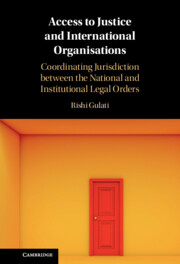 Access to Justice and International Organisations
Access to Justice and International Organisations Book contents
- Access to Justice and International Organisations
- Access to Justice and International Organisations
- Copyright page
- Contents
- Acknowledgements
- Abbreviations
- Introduction
- 1 International Organisations and Their Access to Justice Obligation
- 2 The Criteria for Assessing the Appropriateness of Dispute Resolution Mechanisms at International Organisations
- 3 Assessing Dispute Resolution Mechanisms at International Organisations
- 4 The Nature of Institutional Immunities
- 5 Realising Access to Justice in Claims against International Organisations
- Conclusion
3 - Assessing Dispute Resolution Mechanisms at International Organisations
Published online by Cambridge University Press: 10 March 2022
- Access to Justice and International Organisations
- Access to Justice and International Organisations
- Copyright page
- Contents
- Acknowledgements
- Abbreviations
- Introduction
- 1 International Organisations and Their Access to Justice Obligation
- 2 The Criteria for Assessing the Appropriateness of Dispute Resolution Mechanisms at International Organisations
- 3 Assessing Dispute Resolution Mechanisms at International Organisations
- 4 The Nature of Institutional Immunities
- 5 Realising Access to Justice in Claims against International Organisations
- Conclusion
Summary
This chapter assesses the compliance of institutional DRMs with the fair trial criteria developed. Three types of DRMs will be subjected to scrutiny. These are permanent judicial mechanisms, arbitration and non-judicialised DRMs. As judicial mechanisms are principally established to resolve employment disputes, the focus is on the leading international administrative tribunals, namely, the UN Dispute and Appeals Tribunals and the Administrative Tribunal of the International Labour Organisation. Second, the chapter will focus on the role international arbitration plays in resolving claims against IOs. The chapter shows that little thought has been given to implement arbitration as a sustainable and viable option to resolve claims against IOs. Unless a specialised arbitral regime is created that takes into account the particularities of disputes involving IOs, the chances of arbitration providing for an appropriate DRM are dim. Finally, the chapter makes a brief comment on non-judicialised DRMs, such as ombudsperson processes. While such DRMs play an important complementing role, they cannot replace an independent and impartial forum empowered to render a binding judgment. Finally, the chapter highlights that alarmingly, in too many situations, private parties cannot access any DRM at the international level at all. Access to justice is thus comprehensively undermined.
Keywords
- Type
- Chapter
- Information
- Access to Justice and International OrganisationsCoordinating Jurisdiction between the National and Institutional Legal Orders, pp. 70 - 130Publisher: Cambridge University PressPrint publication year: 2022


